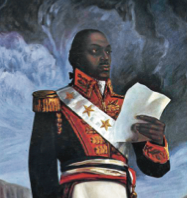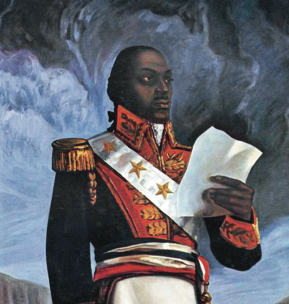 The concepts of equality and liberty emerging as part of the French Revolution of 1789 influenced Haiti’s own revolution. Yet the Haitian Revolution’s radical challenge to racism realized the principle of human emancipation in ways the French had not necessarily anticipated.
The concepts of equality and liberty emerging as part of the French Revolution of 1789 influenced Haiti’s own revolution. Yet the Haitian Revolution’s radical challenge to racism realized the principle of human emancipation in ways the French had not necessarily anticipated.
For months following the 2010 catastrophic Haiti earthquake, striking images of the quake’s destruction and the suffering of the country’s people became familiar footage on U.S. nightly news.
“Since the earthquake, the only discourse you hear about the island is poverty,” said Fabienne Moore, an associate professor of French.
Last year Moore, along with Tania Triana, an assistant professor of Spanish, set out to change that discourse by reminding the UO community of the historical, political and cultural significance of Haiti’s existence—an existence that began with one of the most important revolutions in recent world history.

General François-Dominique Toussaint Louverture was a former slave who became the leader of the Haitian Revolution. Under his leadership, Haiti became the first postcolonial black-led nation in the world.
The Haitian Revolution pitted slaves and other black Haitians against French colonists, including slave plantation masters, in a battle that lasted more than 10 years. When Haiti declared itself a free republic in 1804 (61 years prior to the abolition of slavery in the U.S.), it became the first postcolonial black-led nation in the world, and the only nation to gain independence as part of a successful slave rebellion.
Despite its dramatic importance to the history of human equality, the revolution is not much studied in the U.S., or in Europe—not even in France.
“From the French perspective, it is a revolution of defeat,” said Moore.
The concepts of equality and liberty emerging as part of the French Revolution of 1789 influenced Haiti’s own revolution. Yet the Haitian Revolution’s radical challenge to slavery, racism and colonialism realized the principle of human emancipation in ways the French had not necessarily anticipated.
Last winter and spring, Moore and Triana organized a series of on-campus events featuring novelists, playwrights, performers and films focused on Haiti in an effort to educate UO students and faculty members about the revolution and its repercussions.
Among the guests were novelist Myriam J.A. Chancy, the author of Spirit of Haiti, and scholars Sara E. Johnson and Jana Evans Braziel, who spoke of visual and performance culture in 19th-century and contemporary Haiti.
Moore and Triana also taught a new course, The Cultural Legacies of the Haitian Revolution, the first class at the UO to focus on this topic.
“The Haitian Revolution is a defining moment in the history of freedom and equality,” said Moore. “Part of our intention has been to get people thinking about why this important moment was silenced, why this history has been marginalized—and where else this silencing may have happened.”
—Patricia Hickson




 Watch
Watch  Watch excerpts from the opera, coming soon to Eugene.
Watch excerpts from the opera, coming soon to Eugene. 

 Three’s a charm for a living memorial.
Three’s a charm for a living memorial.